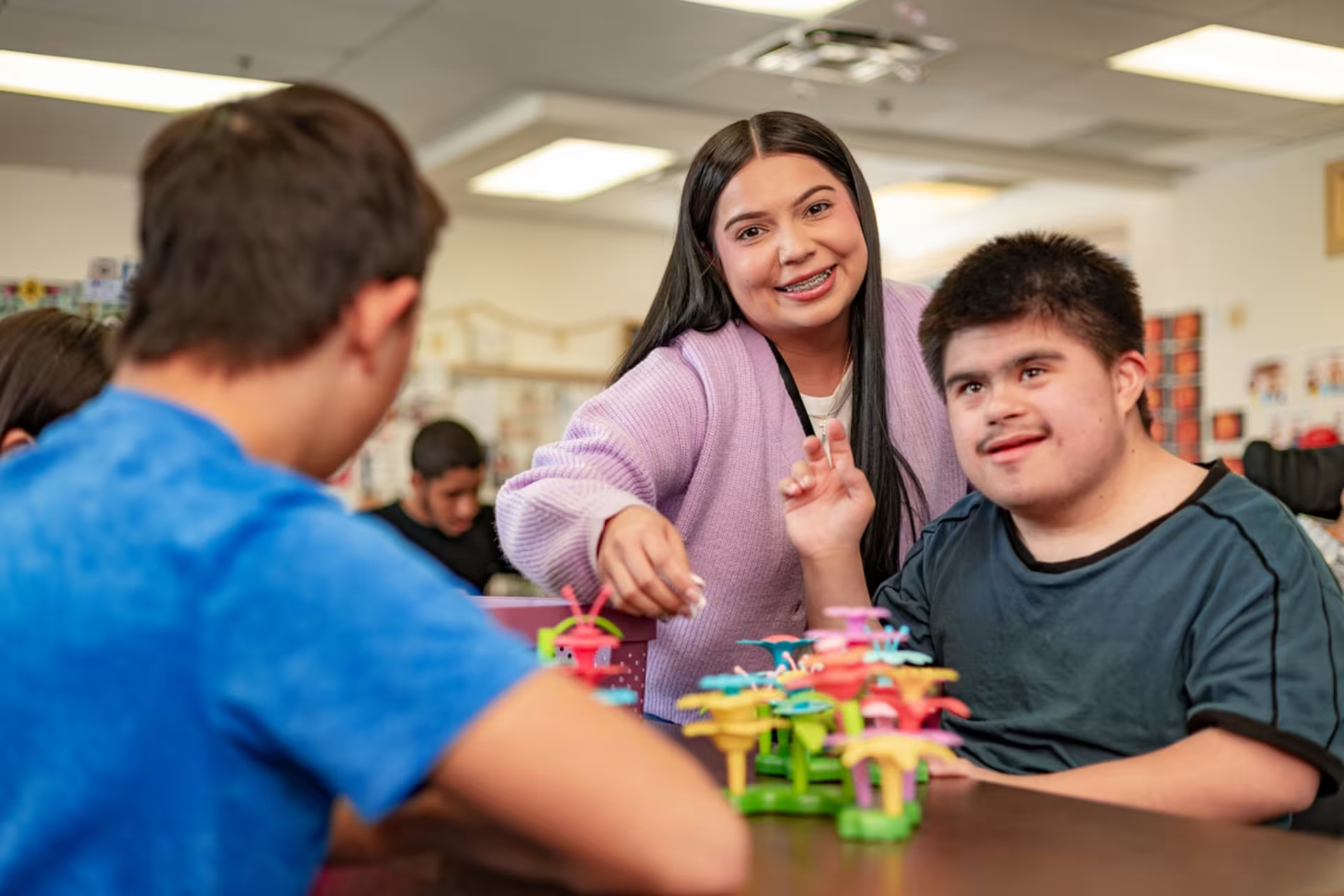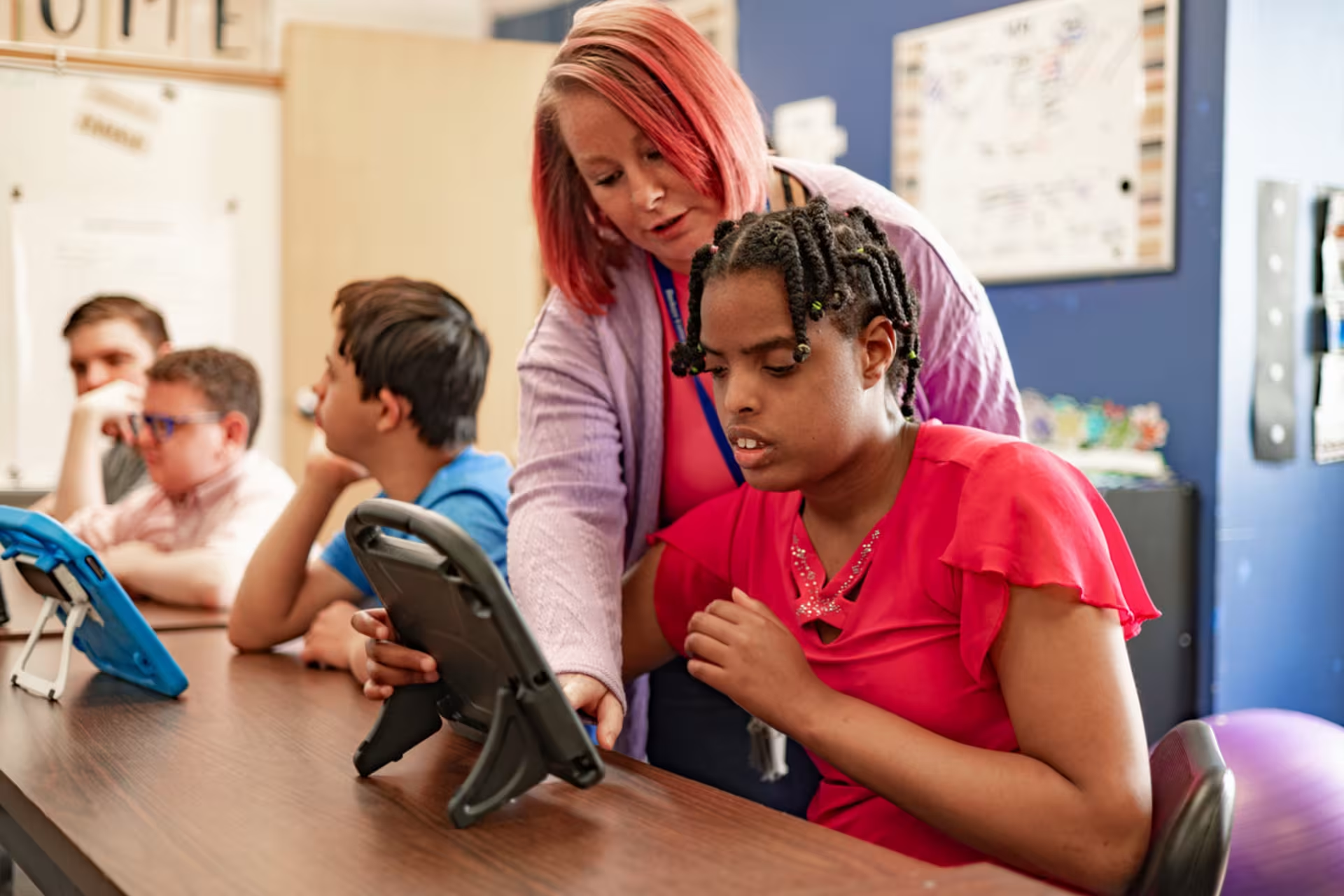
Online Special Education Degrees
Drive Positive Change for Students in Special Education
GCU’s College of Education offers online degrees and certificates in special education(See disclaimer 1) that can help educators build a firm foundation in the social, behavioral and learning needs of students with exceptionalities. You’ll have the opportunity to gain a deeper understanding of developmental psychology, explore how to create engaging learning environments for all students and discover how to implement Individualized Education Plans (IEPs).
Special education teachers often rely on instructional tools and classroom management strategies to ensure that students in their care feel empowered and inspired to learn. Our programs can teach you these valuable skills, helping you feel confident in supporting students to achieve their educational goals.

Explore Online Special Education Degrees by Degree Level
We offer online special education degrees and certificates tailored to every stage of the teaching journey, whether you are an aspiring teacher taking your first steps toward the classroom or an experienced educator looking to gain new endorsements through a graduate degree or certificate. Our programs are designed to support educators at all levels to grow, specialize and make a meaningful impact in the lives of students with exceptionalities.
Licensure vs. Non-Licensure
GCU offers online special education degrees with both licensure and non-licensure pathways. It is important to decide what type of program is best for your career goals and aspirations. Teaching licensure is required to work as a certified teacher in public school districts.

Bachelor’s Degrees
Our online bachelor’s degrees(See disclaimer )in special education are dual degree programs designed to lead to initial teaching licensure. These programs provide you with foundational knowledge in teaching pedagogy and show you how to specialize your instruction for students with exceptionalities.
Licensure degrees require a student teaching component. Additional testing, practicum hours or experience may be required to obtain early childhood, elementary or specialized education teaching licensure. Be sure to check your state-specific guidance and requirements for teaching licensure.
Master’s Degrees
We offer online master’s degrees in education and special education for current teachers with licensure, as well as for those seeking to change career paths by obtaining initial teaching licensure. These programs help graduates develop advanced skills in areas such as behavioral interventions, educational advocacy and the use of assistive technologies as educational aids.
Doctoral Degrees
If you are interested in positioning yourself to potentially step into a leadership position within the field of education, consider earning a Doctor of Education in Organizational Leadership: Special Education. We offer both qualitative- and quantitative-focused programs for conducting and applying research to make a difference in the education landscape. When combined with teaching licensure in your state, a doctorate can prepare you to teach at any level.
Certificates
Online special education certificates offer focused learning that supports professional development and helps educators address the evolving needs within special education settings. While certificates alone may not lead directly to licensure or advanced roles, they can serve as valuable additions to an education degree.
Start Building a Bright Future Working in Special Education
At GCU, earning your special education degree online is more than just a path to a career — it’s a journey of finding your purpose, growing in character and making an impact. Rooted in a Christian worldview, we offer a faith-integrated curriculum that can prepare you to lead with integrity and develop a heart for serving others.
Learn more about our admission requirements and the steps you need to take to apply. Explore GCU’s accreditation, which reflects our commitment to meeting established standards set by accrediting bodies. You can also see how our interactive learning platform can support you in your studies.
Admission Requirements
Accreditation
Interactive Learning Platform
"I would say to anyone who is looking to further their career with GCU: take a leap of faith and trust the process. Stepping from one career into the next, that purpose that I was looking for, GCU literally brought it front and center."
"I would say to anyone who is looking to further their career with GCU: take a leap of faith and trust the process. Stepping from one career into the next, that purpose that I was looking for, GCU literally brought it front and center."
Frequently Asked Questions
Here are some answers to frequently asked questions about earning special education degrees online. These FAQs can help you determine the best program for your personal and professional goals.
What can you do with a special education degree?
What is an online special education degree called?
Can you get a special education degree online?
What degree does a special education teacher need?
Careers in Special Education
There are many career opportunities for special education degree holders. Depending on the degree level, you can pursue roles working directly with students in the classroom or supporting districts and teachers behind the scenes.
An education degree, combined with teaching licensure, can prepare you for careers such as:
Preschool special education teacher
Kindergarten special education teacher
Elementary special education teacher
Middle school special education teacher
Secondary school special education teacher
Special education teaching assistant
Postsecondary education teacher
Education administrator
Median annual wage for special education teachers as of May 2024(See disclaimer 4)
Average tenure of GCU’s full-time faculty in the College of Education
Student Resources
Whether you’re pursuing a certificate or a degree, you will find dedicated support as you complete your special education classes online. As an online student, you can benefit from greater flexibility and additional resources such as access to the Student Success Center. Speak with your university counselor to learn more about potential scholarships and the cost of tuition for your program.

Make a lasting impact in the lives of students with exceptionalities — pursue a special education degree from GCU and discover how you can guide students toward their future.
If you are seeking licensure/certification, please refer to the "Accreditation and Compliance/State Disclosures” link for the specific program of interest’s website for your location and/or employment state’s licensure requirements, per 34 CFR 668.14(b)32 and 668.43(c).
Excluding observational and practice-based experiences and student teaching.
- U.S. Bureau of Labor Statistics. (2025, April 18). Work Environment. Occupational Outlook Handbook. Retrieved July 9, 2025.
- U.S. Bureau of Labor Statistics. (2025, April 18). How To Become a Special Education Teacher. Occupational Outlook Handbook. Retrieved July 9, 2025.
- The earnings referenced were reported by the U.S. Bureau of Labor Statistics (BLS), Special Education Teachers as of May 2024, retrieved July 8, 2025. Due to COVID-19, data from 2020 to 2024 may be atypical compared to prior years. BLS calculates the median using salaries of workers nationwide with varying levels of education and experience. It does not reflect the earnings of GCU graduates as special education teachers, nor does it reflect earnings of workers in one city or region of the country or a typical entry-level salary. Median income is the statistical midpoint for the range of salaries in a specific occupation. It represents what you would earn if you were paid more money than half the workers in an occupation, and less than half the workers in an occupation. It may give you a basis to estimate what you might earn at some point if you enter this career. Grand Canyon University can make no guarantees on individual graduates’ salaries. Your employability will be determined by numerous factors over which GCU has no control, such as the employer the graduate chooses to apply to, the graduate’s experience level, individual characteristics, skills, etc. against a pool of candidates.

